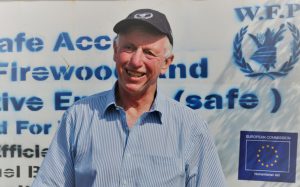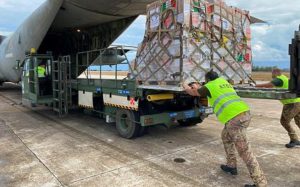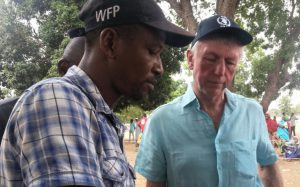Reading graduate and former Assistant Executive Director at the World Food Programme, Jim Harvey, shares his expert opinion with CONNECTED on the impact of COVID-19 on countries already suffering from food insecurity.
Jim Harvey’s agriculture degree at the University of Reading provided a springboard for an incredible career spent trying to feed people around the globe, and he speaks to CONNECTED about the plight faced by those who rely on the World Food Programme (WFP) during a pandemic.
A solid foundation
Jim, who was a student at the University from 1968 to 1971, asserts that studying agriculture and business management at Reading gave him a solid foundation for a career which culminated in becoming the WFP’s Assistant Executive Director and Chief of Staff.

Jim said: “I’m not sure I appreciated at the time just how good a foundation this degree provided me with. But looking back, the cross-sector and multi-thematic issues that agriculture embodies have been a massive help throughout my career.
“After graduating, I worked on a farm for a year before being posted as a volunteer to Botswana to work with an agricultural research team looking at improving farming methods for smallholder farmers – from there I was hooked. After nearly twenty years of working in mainly agricultural research, my career shifted into more policy type work where I was able to apply my technical experience and knowledge. I joined the Department for International Development [DFID] working as a livelihoods adviser, and ending up in Rome as the UK representative to the three United Nations [UN] Food and Agriculture agencies, Food and Agriculture Organization [FAO], International Fund for Agricultural Development [IFAD] and WFP, before joining the WFP as Chief of Staff.
“Had you asked me back in 1971 on a Friday night in Reading’s SU bar whether I would one day be the UK Ambassador to the UN in Rome, and WFP’s Chief of Staff, I’d have asked if you were joking. My degree at Reading certainly took me to places and jobs I would never have imagined.”
Shaping change
Jim enjoyed every aspect of his career, including championing WFP’s expansion of cash-based food assistance.

Jim explains: “I was particularly proud to have been a part of the shift to cash-based assistance in the form of electronic vouchers, transfers and debit cards using technologies such as Blockchain and iris scan recognition. The cash option empowers people with greater dignity, safety and choice, whilst supporting markets and encouraging local private sector involvement, such as the shops and supermarkets you see setting up in refugee camps.
“WFP now have flexibility to adapt their approach to each situation. For example, for refugees from Syria living in Turkey, they provide debit card-based assistance as markets work well and provide everything people need. Whereas in inaccessible parts of Syria, we resorted to high-level airdrops to get food to cut-off people.
“This was a first in the history of humanitarian emergencies and a huge technical challenge, but WFP is full of amazing people who can get these things done.”
Find out more about WFP’s cash-based assistance, Blockchain digital payments, and high-level airdrops.
The economic fallout
Jim is now largely retired, but he follows the issues that countries and people with food insecurity will be facing during the pandemic, and he offers an insight into WFP’s work.
Jim said:
“While I was with WFP from 2012-2017 we were assisting 80 million food-insecure people worldwide; last year that increased to 100 million; and it is projected to increase to 138 million as a result of COVID-19.
“This is because COVID-19 has amplified the situation that already existed. Many families in developing and middle income countries are dependent on informal jobs and money sent from overseas, but virus restrictions have ended such work; children were getting nutritional school meals but schools are shut; and smallholder farmers are struggling due to the interruption of supply chains.
“These people don’t have the resources to simply wait for a return to normality. It’s the most vulnerable people who are suffering most from the economic fallout of this virus, especially in conflict areas and countries that don’t have the infrastructure or resources to cope.
“WFP is also the UN’s main logistics operator, managing the humanitarian air service that gets key aid workers and cargo to remote places, and the global network of humanitarian response depots which store kit for rapid response in crises. Both have been utilised extensively during the pandemic, working closely with organisations such as the World Health Organisation [WHO] and UNICEF to transport medical and other supplies where countries have struggled to secure them.”
Read more about the importance of school meals, the WFP’s humanitarian air service and humanitarian response depots.
Advocating aid
Jim has always been a strong supporter of providing effective aid and knows that a crisis such as COVID-19 only increases what is already an urgent need.
Jim explains: “We live in a connected world. There’s a practical self-interest in helping those suffering in other countries. For example, preventing food insecurity might mitigate the effects of conflict that forces people into migration. And there can be no full return to normality until the global COVID-19 situation is brought under control. The UK is a strong supporter of WFP, contributing $698 million USD in 2019.
“But, of course, the main thing is that it’s just not right that such huge gulfs of wealth, understanding and entitlement exist. It’s important to recognise that these gulfs don’t just exist between countries, but also within countries. We have food poverty in Britain that we’re only just starting to acknowledge and some of the global lessons might even be relevant here.

“I feel proud that I did my best during my career. Unfortunately, some of the places where I lived and worked – Darfur, Syria, Yemen – fell into conflict, and many of our more tangible achievements probably aren’t still visible today. But I’m glad I ended up with the UN as its political neutrality enables you to work with hundreds of partners and do things in a way that individual nations can’t. It was like coming full circle as many of WFP’s largest programmes are in those same countries I began in.
“I’m pleased I was still able support the people so badly affected. And it’s fantastic to see food and agriculture once again getting the strategic attention they deserve.”
Discover how our other alumni are working to put food on people’s tables in their local community.





